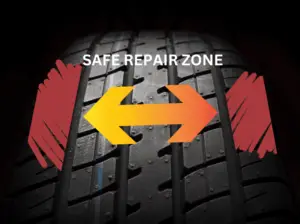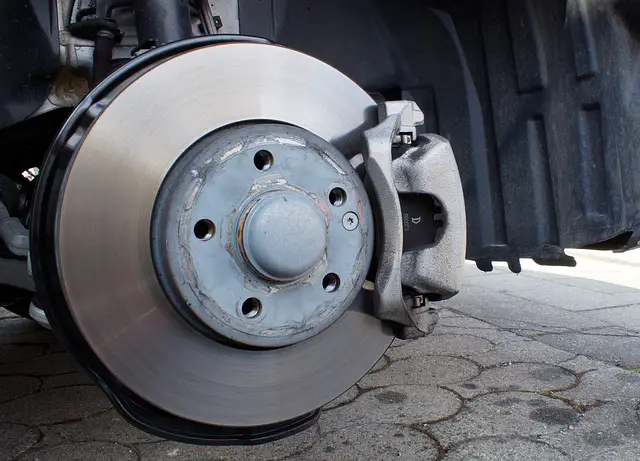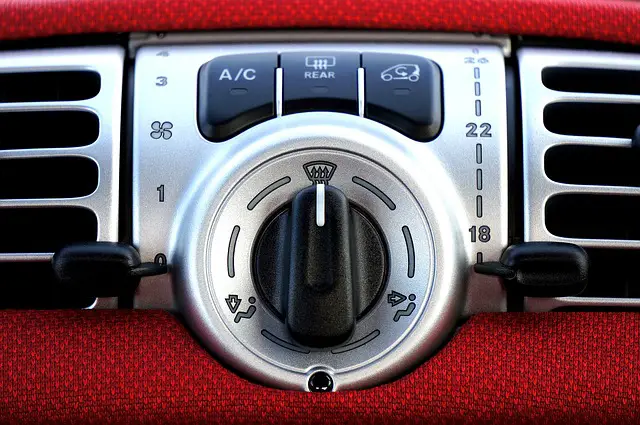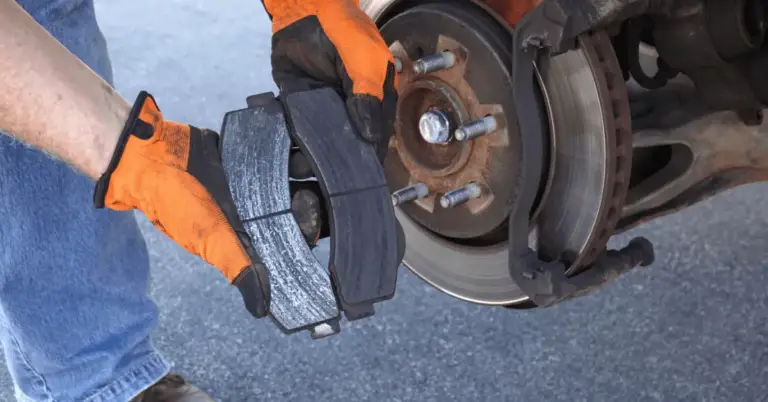Whether you want to buy and fit your own tires, sell your tires, and need to work out courier delivery costs or get into shape tire flipping, it’s important to know how much tires weigh.
Generally, a car tire weighs between 19lbs/8.61kg for a summer tire and 44lbs/19.9kg for an off road tire. This varies depending on the rubber compound density, tire belts, and sidewall thickness.
The below tire weight table uses a rim size of 16 inches to provide comparables.
| CAR TIRE TYPE | AVERAGE WEIGHT OF A CAR TIRE |
| SUMMER | 19 Lbs / 8.61 Kg |
| WINTER | 23 Lbs / 10.4 Kg |
| ALL-SEASON | 20 Lbs / 9.07 Kg |
| ALL-TERRAIN | 34 Lbs / 15.4 Kg |
| PERFORMANCE | 20 Lbs / 9.07 Kg |
| STUDDED | 40 Lbs / 18.1 Kg |
| OFF-ROAD | 44 Lbs / 19.9 Kg |
So why do some types of tires weigh almost double the others? Let’s explore the role of each tire component that increases its weight.
Summer Tire Weight
With softer synthetic and less dense rubber compounds, summer tires weigh the least of all tire groupings. Less thick tread blocks and slightly less firm supporting sidewalls also mean less rubber is needed in their manufacture. All summer tires have only two tire belts, less thick beading, and less bead wire than all other tire types.
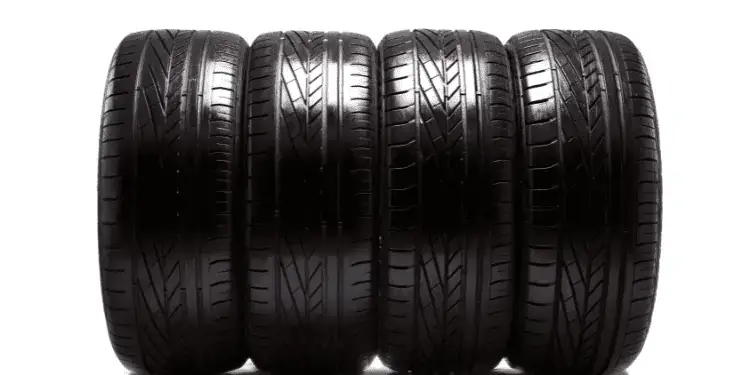
The average summer tire weighs 19lb or 8.61kg.
Winter Tire Weight
Winter tires are heavy with deeper tread and a higher – more heavy – natural rubber content. Winter tires generally have taller sidewalls which add a few ounces to the weight. In addition, some have three tire belts instead of two and even strengthen these with Kevlar, Rayon, and fiberglass to help cope with potholes and poor road surfaces that winter can bring.
The average winter tire weighs 23lb or 10.4kg.
All Season
All-season tires are great if your state climate isn’t extreme enough for winter or studded tires. Because of this, all seasons, depending on the brand, have winter and summer tires characteristics.
An all season tire will have two tire belts, a medium synthetic rubber compound, and a small amount of silicone added to the tread blocks.
An average all season tire weighs in at 20lb or 9.07kg.
All Terrain Tire Weight
All terrain tires are a great solution when you occasionally go off-road and spend quite a bit of time on the pavement. As you know, the tread is an awful lot thicker on all-terrain tires.
This, coupled with a toughened tire sidewall, makes them 50% heavier than all-season road tires. Often off-road tires will have more than two tire belts inside them.
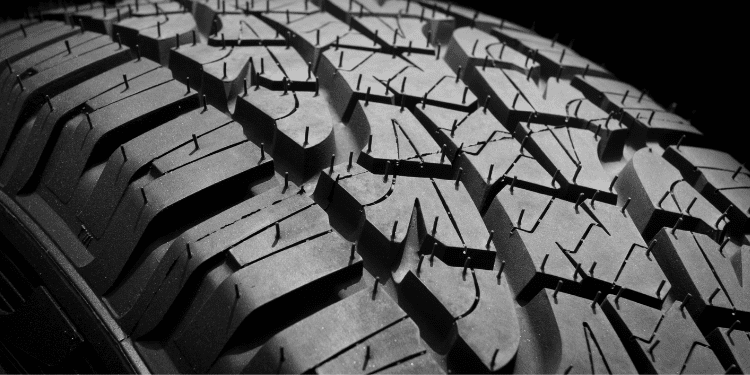
As all terrain tires are subjected to harsher driving conditions, the bead that sits inside the rim is thicker and often reinforced with thicker bead wire.
On average, an all terrain tire weighs 34lb or 15.4kg.
Performance Tire Weight
It’s a common misconception that performance tires weigh less than their all season counterparts. The compound used in performance tires is denser and heavier per square inch and weighs more.
Coupled with the increase in the thickness of the tire sidewalls and the likelihood that a performance tire has three steel tire belts rather than two and an extra casing ply, it adds weight to what looks at face value a lighter tire.
An average performance tire weighs in at 20lb or 9.07kg.
Studded Tire Weight
A studded tire has between 50 and 300 small metal studs, each weighing less than a tenth of an ounce. Together, though, they can add a pound to the total weight. Studded tires weigh 40lbs or 18.14kg, so the stud weight is insignificant.
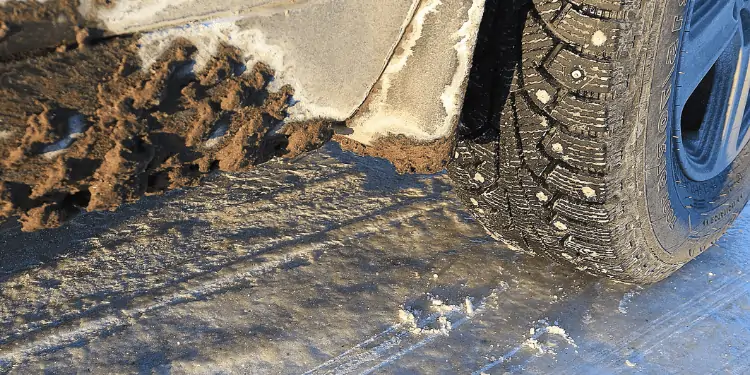
The additional weight comprises a much heavier rubber compound, at least three steel tire belts, thicker beads, a stronger sidewall, and enhanced crown ply.
A typical studded tire weighs 40lb / 18.1kg.
Off Road / Mud Tire Weight
The heaviest truck tire is the off-road variety. These tires are designed to get you through the worst environments possible with thicker tread and sturdy sidewalls. The sidewalls are extremely thick, as often the tire manufacturer advises a lower psi to help with grip, which puts added pressure on the sidewall.
The tread blocks are deeper, and the tire bead thicker to prevent the tire from popping off the rim when the tire is underinflated. These add weight to the tire.
An off road mud tire weighs on average 44lbs or nearly 20kg.
What Affects Tire Weight?
When thinking about how much extra weight a new heavier tire may affect your car, remember that you’ll multiply an increase in tire weight by four.
So if you are looking at a tire weight increase of 9lbs, ensure you consider the 36lbs total increase in weight your car will be carrying.
In reality, unless your car is underpowered already, or you have a tonne of customizations that have increased the weight, you will hardly notice a 36lbs difference in car tire weight.
Although the weight may have increased, you will also have extra performance from the new tires.
Despite the increased weight, you may notice better stopping distances, better cornering, and a better ride with the new heavier tires.
Selling Your Used Tires & Sending Them By Courier
If you’ve upgraded your car tires, the ones you’ve taken off your car may still have quite a bit of tread on them. If so, you may feel that you can cover some of the expense of your new tires by selling the old ones.
Postage and courier worries can create enough headaches to make it hardly worth selling the tires in the first place.
If the buyer is local to you and can’t collect, you’re left with the dilemma of posting them.
Not only are tires quite bulky they’re also a weird shape to package correctly.
Add to this; they weigh quite a bit, too can all be off-putting.
The larger delivery companies like FedEx and UPS generally require you to either foil pack the tire or package it in corrugated cardboard. They don’t take tires that haven’t been packaged, which is a shame. They argue that the tire could get damaged on the conveyer belts the tire will travel along at the distribution center.
The good news is that you can put your details on many sites and get quotes delivered to your inbox. These courier comparison sites are open to smaller operators whose packing criteria and prices are better for moving tires around the country.
You should expect to pay a courier between $15 and $30 per tire. The price will depend on the delivery miles and if the courier – especially smaller operators – are already traveling to the buyer’s area on another delivery.


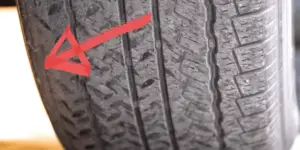


![Will A Cracked Rim Leak Air? [NOT ALWAYS] Tire-blowout](https://carzaza.com/wp-content/uploads/2023/12/Tire-blowout-300x224.png)
![How Long Do New Tires Take To Put On? [ANSWERED] Torque-wrench-tire](https://carzaza.com/wp-content/uploads/2023/12/Torque-wrench-tire-300x150.png)
